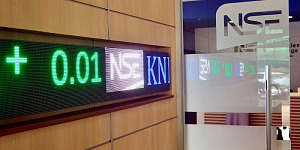Investors on the Nairobi Securities Exchange (NSE) Wednesday lost about Sh54 billion in paper wealth, the biggest single-day decline in four months, hit by a slump in the share price of market driver Safaricom.
Data showed that the NSE’s market capitalisation fell by Sh53.8 billion to stand at Sh2.776 trillion Wednesday the largest margin of a daily decline since May 28, 2021, when the bourse shed Sh58.5 billion.
The telco’s share shed Sh1.10 during Wednesday’s trading to close at Sh41.80 on the back of net foreign investor sales worth Sh399 million on the counter.
This price fall resulted in a Sh44.07 billion decline in the company’s valuation at the bourse—an indication of the stock’s huge influence on the market.
Top banks and EABL also shed value yesterday, contributing to the market cap erosion, mainly on price corrections following recent rallies linked to good financial results for the half year to June.
“We saw a more supply than demand on the Safaricom share, with foreign investors mainly selling. The sentiment around the stock is still neutral, however, given that the main story on the stock around the Ethiopia entry is still at the stage of wait and see,” said Lisa Kimathi, an analyst at Standard Investment Bank (SIB).
The share prices of both Equity and KCBretreated following a rally in the first half of the year when their net profits doubled to Sh17.9 billion and Sh15.3 billion respectively.
Equity shed Sh4.72 billion in market cap Wednesday after its share price dropped by Sh1.25 to close at Sh51.75, while KCB’s share price drop of Sh0.80 resulted in its market cap falling by Sh2.57 billion.
EABL meanwhile recorded a price fall of Sh1 to close at Sh174, with its valuation dropping by Sh790.8 million.
“The banks had gone up a bit, with Equity especially gaining. The fall is therefore likely a case of price correction,” said Ms Kimathi.
Safaricom accounts for 60.3 percent of the NSE’s total market cap, meaning that any movement on its price tends to have a pronounced effect on the performance of the market.
Its recent price rally, following the news late May of the successful issuing of a licence for entry into the Ethiopian market, has been one of the main reasons why the benchmark NSE 20 share index has gained 7.1 percent and the All Share Index 5.1 percent in the last three months.
When combined with Equity Bank, EABL, and KCB, their share of the NSE’s total market cap goes up to 77.8 percent, and they also account for the lion’s share of daily traded volumes on most days.
The concentration of activity and wealth in just a few firms, which is a material risk to the market should any shock negatively affect the performance of these counters, has raised concerns from investors and the Capital Markets Authority (CMA).
It also distorts the view for investors looking into the health of the market, given that gains or declines on these stocks give the impression of a market that is performing well or badly regardless of the performance of the other counters.
Their large tradeable liquidity also makes them the preferred stocks for foreign investors, who usually go for counters that can support their large-ticket trades.
They, therefore, tend to be hugely affected whenever foreign investors are making exits.
The solution, according to the CMA, is to attract other large listings to the market that can dilute the influence the four firms have on the bourse.
The NSE has, however, failed to attract a large IPO in the last decade, with the only such listings since 2010 being that of Britam in 2011, the NSE self-listing in 2014, and the ILAM Fahari Reit in 2015.

















 FR
FR 








































